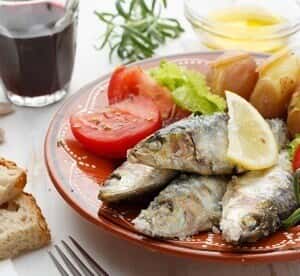
People who eat primarily plant-based diets with some seafood cut their colorectal cancer risk dramatically, by 43 percent. (This type of diet has a name: pescovegetarian.) These diets tend to have plenty of omega-3 and some omega-6 fatty acids.
Do Omega Fatty Acids Protect People from Cancer?
People who eat more foods rich in omega-3 fats when they are younger adults seem to have a lower likelihood of certain cancers as they grow older (International Journal of Cancer, Oct. 17, 2024). That’s what scientists found in a study of more than 250,000 volunteers in the UK Biobank.
At the start of the study, the participants answered detailed questionnaires about their customary diets. Researchers then collected health data on the study subjects over nearly 13 years, with special emphasis on cancer diagnoses. During that time, almost 30,000 developed some type of cancer.
People who consumed more omega-3 and omega-6 fatty acids were less likely to develop cancer overall. Several individual cancers were less probable in people eating lots of omega-6 fats from grains or omega-3 fats from fish or nuts. Stomach, colon, liver and lung cancer dropped as the amount of either omega rose.
One exception was prostate cancer, which was a bit more likely among men consuming more omega-3 fats. Researchers have reported such a link before, so it is not a surprise.
Where Do You Find Omega Fats?
The primary source of omega-6 fats are vegetable oils such as safflower or sunflower oil. Nuts like walnuts and seeds such as pumpkin seeds are also rich in these fats. For omega-3 fats, the best sources are fatty fish like salmon, mackerel or trout. Fish oil and flaxseed oil also provide omega-3s, along with, once again, walnuts as well as flaxseeds.
Study Found Vegetarian Benefit for Cancer Risk:
This is not the first study to find a link between these healthful fats and a reduced cancer risk. A study nearly ten years ago found something quite similar. The Adventist Health Study included more than 77,000 Seventh Day Adventists (JAMA Internal Medicine, May, 2015). Eating meat, drinking alcohol and smoking is discouraged by the religion, and about half of the participants ate no meat. Some were vegan, while others included eggs and dairy or fish in their plant-based regimens.
The average follow-up in the study was just over 7 years, with 490 cases of colon or rectal cancer detected during that time. Vegetarians were 22 percent less likely to be diagnosed with colorectal cancer than meat-eaters. Those who regularly included eggs and dairy but no fish still had an 18 percent lower risk.
This observational study couldn’t establish cause and effect, but it looks like a strong argument to eat more vegetables and cut back on meat. Substituting fish and shellfish for meat or poultry appears to offer the greatest benefit.
Update on Diet and Cancer Risk:
A different analysis found that a prudent/healthy dietary pattern, particularly a Mediterranean-type diet, reduced the chance of breast cancer recurrence (Breast Care, April 2018). The Mediterranean diet is chock-full of vegetables and fruits and contains more fish than red meat. One discordant note: the Mediterranean diet often or usually includes wine with meals, and this analysis, like others, shows that alcohol consumption raises the cancer risk for the breast.
Specific foods may also be linked to lower cancer risk. One review found that mushrooms can activate the immune system and reduce the likelihood of cancer cell metastasis (Evidence-Based Complementary and Alternative Medicine, April 22, 2018). This could be a delicious component of a pescovegetarian diet.
How to Cook Fish:
Some people are reluctant to eat fish because they don’t know how to cook it. Most types can be poached, broiled or grilled, but it may cook more quickly than meat. If you would like some delicious recipes, consider our book, Recipes & Remedies From The People’s Pharmacy. You’ll find instructions for dishes such as fish tacos with radish and lime, shrimp and grits, horseradish-crusted salmon with cranberry catsup and spicy fresh tuna salad, along with plenty of vegetarian dishes.
Citations
- Zhang Y et al, "Associations of plasma omega-6 and omega-3 fatty acids with overall and 19 site-specific cancers: A population-based cohort study in UK Biobank." International Journal of Cancer, Oct. 17, 2024. DOI: 10.1002/ijc.35226
- Orlich MJ et al, "Vegetarian dietary patterns and the risk of colorectal cancers." JAMA Internal Medicine, May, 2015. doi:10.1001/jamainternmed.2015.59
- Weigl J et al, "Can nutrition lower the risk of recurrence in breast cancer?" Breast Care, April 2018. DOI: 10.1159/000488718
- Ayeka PA et al, "Potential of mushroom compounds as immunomodulators in cancer immunotherapy: A review." Evidence-Based Complementary and Alternative Medicine, April 22, 2018. DOI: 10.1155/2018/7271509

